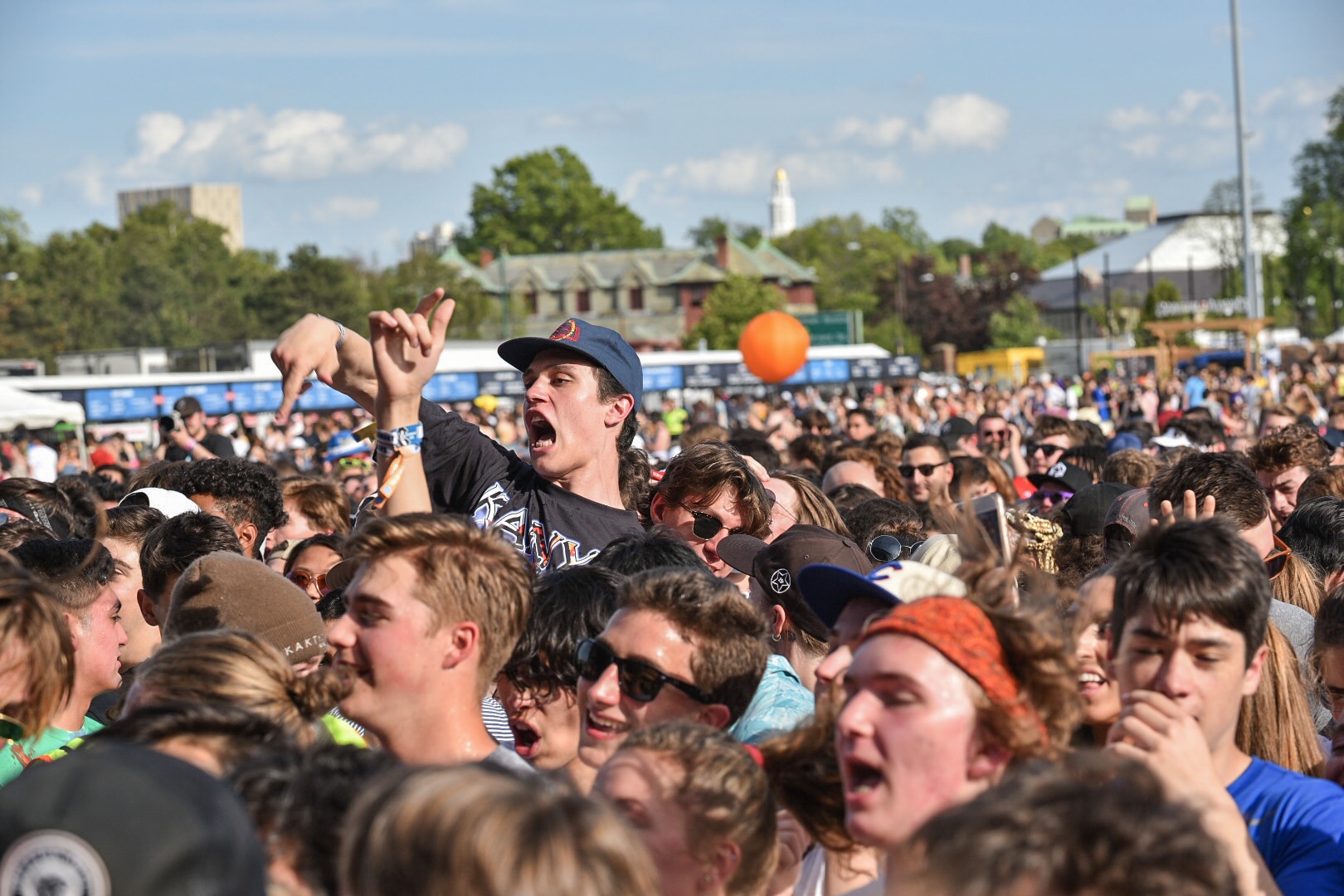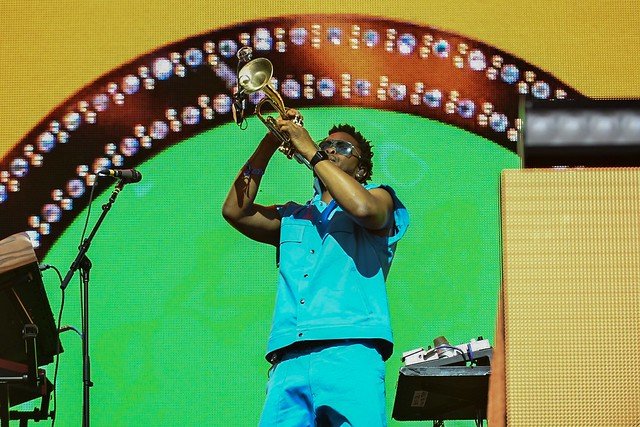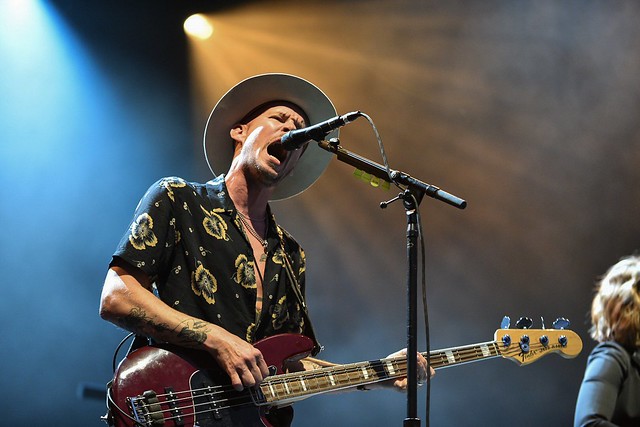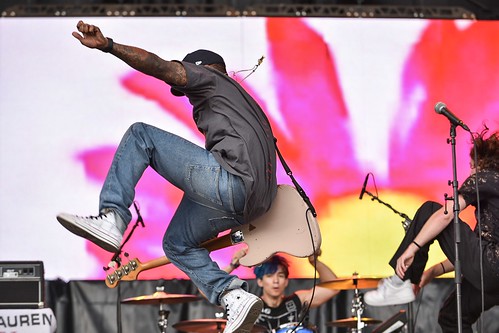
By the time the lights came up after twenty one pilots’ set at Boston Calling 2019 Friday night, the shovels were starting to come out. A dreadful turnout – coupled with a middling slate of artists – meant the festival was, at the very least, in very deep trouble. There was no way this was the kind of crowd Crash Line Productions wanted.
One week later, it’s hard to make sense of what Boston Calling is. Ten editions of this festival, and it truly feels like it is yet to define what it wants to be. But this edition was different in a negative way: It was the first year where not a lot of my social network (which has a good amount of music lovers) wanted to spend the money to be at the festival. That is a worrying prospect, unless we are aging out of being in the festival target demographic. Which could be true. I’m an old man. The lineup is among the weakest in the festival’s history, without big draws.
Tiered pricing, which I wrote about here, might have played a role. While it could have sustained early demand, in effect it might have priced the delayers who could have easily done something else with their holiday weekends. But I think it more has to do with the fact that Boston Calling booked an at best middling slate, had artist dropouts that dampened expectations and was not priced at the range that make the festival worth it.
Still, the festival remains well-run. Logistically, it is a major improvement from 2017’s edition, the last one I attended. It is easy to meander and not feel claustrophobic, even when the festival might have packed more people on Sunday than any day of 2017’s cramped fest. And the sound is much improved – even if this festival is one weekend-long noise complaint.
But the issues with Boston Calling remain. First, the festival insistence on booking cis men as headliners – only Sia and Robyn have headlined the festival (and that was in the same year) – is depressing. Especially when you read the words of Trevor Solomon, the festival’s talent buyer, who seems to not see criticisms of an all-white, male slate of headliners in 2018 as an issue.”It happens,” he said in an interview with the Boston Globe. “On the flip side, everyone’s entitled to their opinion. I take everything they say in stride.”
Two years ago, I asked him a question about this. Solomon said: “There are a lot of awesome female artists out there, and you want to have them on your festival. Sometimes they’re not headliners and sometimes they are.” An amended version of that quotation: Sometimes they’re not headliners and most of the time they are not headliners. That 23 out of 25 possible Boston Calling headlining slots have gone to cis men shows a staggering institutional bias. It should be the top priority of festival bookers to change this. Simply saying that sometimes they will headline is not enough. If there’s one thing that should dissuade people from buying future tickets, it’s this. I’m not sure I want to continue to attend. One lingering question remains: why the hell wasn’t Janelle Monáe booked as a headliner in the first place?
Being a festival on the coast, this festival is not very eco-friendly. There are very few people bringing their own water bottles, I didn’t see anyone drinking from reusable pints and there are little to no recycling bins on the festival grounds (there’s some suggestion that they sort the recycling afterward, but I don’t know for sure). There’s certainly some encouragement on the festival’s social media accounts for fans to bring their own bottles. But the messaging should be improved.
Founded in 2013, this festival is still young. It’s changed locations, it’s grown in size. This is the year where it really felt like the growth plateaued. The only real improvement to the formula was expanded programming in the Arena, which added tech demonstrations and DJ sets.
Boston Calling 2020 is an opportunity for them to correct some missteps. Do I have faith that all these issues will be addressed? To be honest, no. And the changes would need to be sustained over time.
But there was music and enjoyment to be had. Read on for the day-by-day review.
Friday
It’s time for some overextended hockey metaphors. Friday was the first period: Boston Calling gave up a few easy goals. In losing Black Star and Janelle Monáe ahead of the fest, the lineup was short handed. CHVRCHES took Monáe’s place, but even singer Lauren Mayberry noted that there was no way to replace that incredible talent. Greta Van Fleet showed up and cosplayed as Led Zeppelin for an hour.
twenty one pilots brought its much-talked-about energetic set. But the crowd that sold out TD Garden 8 months ago didn’t seem to show up all that much. There was a lot of green/yellow camouflage, the band’s hallmark, but it was not a 17,000-strong contingent. That brings up the main problem with a booking a band in this fashion. It obviously made a certain amount of sense for festival bookers: this band is huge and beloved, and Boston Calling must have wanted to pay tribute to its history (an earlier twenty one pilots set was voted a fan favorite years ago) and catch the band on its album cycle. But that October show must have cost the festival a certain amount of tickets. It’s easy now to call it a potential misfire to book twenty one pilots as headliner, but booking a festival is not easy at all.
Still there was a burst of excitement to be found: Christine and the Queens, who prefers just Chris these days, gave an exuberant and theatrical performance, replete with choreography and pyrotechnics. Chris is undeniably criminally underrated and, as a result, booked far too low on festival bills. There is a headlining spot waiting for Chris.
Heading into the intermission after day one, Boston Calling was down five goals to one. Usually, there is no coming back from such a drubbing. But there were still two days to go. But a sort of comeback began… (This concludes this haphazard hockey metaphor.)
Saturday

Days two and three were a different story altogether. It seemed that the shovels could be put away. Crowds filtered in each day — growing to a critical mass by around 6 p.m. For day one, in contrast, it seems that the crowd peaked at around 5 p.m., at about 50% of the total attendees that attended on Sunday. Crowd level is just one indicator of a festival’s health, however.
Day two was a remarkably strong day in terms of the lineup. I feel like one must have a #take about headliners, and for Tame Impala my take is that I don’t really have one. They played all the hits, which was nice, and the light shows was fine. The band has no stage presence; it reminded me of the Tool set from 2017 in that things happened on stage (like making pleasurable music and a cool confetti drop), but not a lot, and they were basically stationary for a good portion of the set. It’s good, but I wonder if the set was a little underwhelming because the band wasn’t playing new material. Or maybe it just isn’t my thing.
Saturday’s undercard was the weekend’s strongest and most cohesive in terms of the lineup. After a performance from the Boston Ballet (I remember when I saw them at a basement show in Allston – true crustpunks), Sidney Gish kicked things off on the red stage. Her set, which we’ve gotten to know pretty well since the release of No Dogs Allowed, was as polished as ever. It was fun to see festival goers who may not have heard of Gish react to her lyrics, which are full of hilarious little bits of wordplay. Not only has she picked up some new fans, there was a loud contingent of fans up on the barrier for her. (Now is a good time to mention that tickets are on sale now for her September show at the Sinclair. Head to the venue and pick up a ticket without fees at the box office.)
Fresh off a homecoming gig at a sold-out Great Scott Official Boston Calling Aftershow™, Boston (now Nashville) legends Pile played a hard-hitting, brash and intense set of songs showcasing the new album Green and Gray. By the time the set ended, frontman Rick “From Pile” Maguire had laid down his guitar, jumped off the stage and was in the crowd, wireless mic in hand, pacing around, delivering the lyrics to “The Soft Hands of Stephen Miller.” It was truly bizarre to hear these songs in the harsh light of day, rather than the sweaty confines of Great Scott. But good.
Perhaps the best run of the festival in terms of consistent enjoyment was the back-to-back sets of Mitski, Big Red Machine and Anderson .Paak. Whoever put this schedule together – for these three sets – thank you.
Mitski’s set was, as expected, wonderful. In just an hour she managed to play at least a song from each of her five albums. (extreme concert reviewer voice) Talk about a career-spanning set. I could go on about how good Mitski and her bandmates are. Mitski is such a great vocalist; her control of the notes she hits, as well as how faithful her singing sounds to the recorded version of her songs is unparalleled – not many artists sound as assured as Mitski does. And she’s singing while doing choreography. Props to the table and chair she’s brought on tour with her – the true sixth and seventh band members.
Big Red Machine brought serious nap time vibes to the red stage. It was much needed after the intense rush of Mitski’s set. Consisting of Justin Vernon as well as members of The National, the band played songs from its self-titled record. I like that Vernon has brought three different projects to Boston Calling (even if Volcano Choir couldn’t play that one year; a fact that I am still sad about).
Then it was time for Anderson .Paak, which was the opposite of nap time vibes. It seemed like the entire festival had come to the Green Stage for this set. The festival sent out a push notification summoning people to see Lil Nas X perform a song. The crowd was electric for “Old Town Road.” It had nothing on the video of Lis Nas X performing for elementary school kids that went viral last week, but it was still a moment that I don’t think can ever be replicated? What a timely booking by the festival, to get the musician responsible for the top song in the world in town for the festival. I was personally worried the Lil Nas X moment would overshadow Anderson .Paak’s set. However, my fears were unfounded. Anderson is such a charismatic performer, and the stage setup was perfect for a festival (he appeared onstage by being lifted with his drum kit. It was sick).
So Saturday was good. But how did Sunday stack up?
Sunday

Sunday’s lineup didn’t know what it wanted to be. There was none of the cohesion that Saturday seemed to bring. There was a good number of Australian bands in the early part of the slate; the Tame Impala hangover was real.
For a festival that has had its fair share of weather calamity (the mud pit in 2017, the canceled Volcano Choir set, which I mentioned earlier but I am STILL sad about), the weekend’s weather was kind of perfect. But the weather gods committed a grave sin: the optimal day for unbearably hot weather is day two NOT day three.
Rolling Blackout Coastal Fever was among the early favorites. The Australian rock band set the tone for the Blue Stage in some ways that day: three-part harmonies, and a commitment to having different singers take turns singing lead vocals. I don’t know why, but I tend to appreciate when bands do this, especially when their vocals aren’t appreciably different.
Snail Mail was next. Lindsey Jordan and her band has felt unstoppable in the last year. The band released LUSH to critical acclaim and seemed to never, ever stop touring. Jordan also previewed songs she has been working on, a good taster, but she pledged to take a lengthy break. It would be well-deserved.
Other highlights from the Sunday slate: Ravyn Lenae, whose R&B was the perfect soundtrack to Sunday afternoon. Rapper Sheck Wes got the earth shaking – literally. The crowd bought into every note and exhortation for the crowd to jump. Truly a great set.
The standout set from the Blue Stage was Brandi Carlile. Her set, while grossly under attended, was beautiful. She played songs from By The Way, I Forgive You, the Grammy-award-winning album with meditations on motherhood. There were also some surprising covers, including a Led Zeppelin song (I did not expect having to write the word Led Zeppelin twice in this review). Carlile also performed “A Case of You” by Joni Mitchell, and holy cow was it a beautiful rendition.
Headlining was Travis Scott, and here is a headliner-worthy artist. The set was energetic. Where Sheck Wes’ set was a tremor, Scott’s set was an earthquake. On a really hot day, one might think a festival goer might call it a day early. But Scott is such a draw that people stayed through til the very end. “Sicko Mode” got the best response, but other cuts from ASTROWORLD were equally beloved. What a way to close out an at times mystifying music festival.
Boston Calling 2019 wrap-up
Boston Calling had some great moments, from getting a musician responsible for the biggest song in the world to show up, to Travis Scott’s intensity, to improvements in the Arena. But this is all stuff any run-of-the-mill music festival can do. The homogeneity across festivals in Boston Calling’s tier is a momentous disappointment.
I asked myself, what is something that has happened at the 9 Boston Callings I’ve attended that made me go “Wow, that could only happen here in Boston.” Honestly, aside from the various Boston sports stars showing up, the only thing I can think of is Tenacious D shouting out Krill. That’s something you can’t script. But to have just one “only-in-Boston” moment is disheartening, especially when you remember this is before MSG Live took a majority stake in Crash Line Productions. This year, there were so few artists the festival could claim as local. Does that instill hope for the future? Does the lack of non-male headliners instill hope for the future?
Mere moments do not create a festival people care to return to. It requires a commitment to knowing the community that is paying hundreds of dollars to be here, and not alienating locals who are shut out for various reasons. There’s so much work to do. And, for Boston Calling, that might require a bottom-up rebuild.

